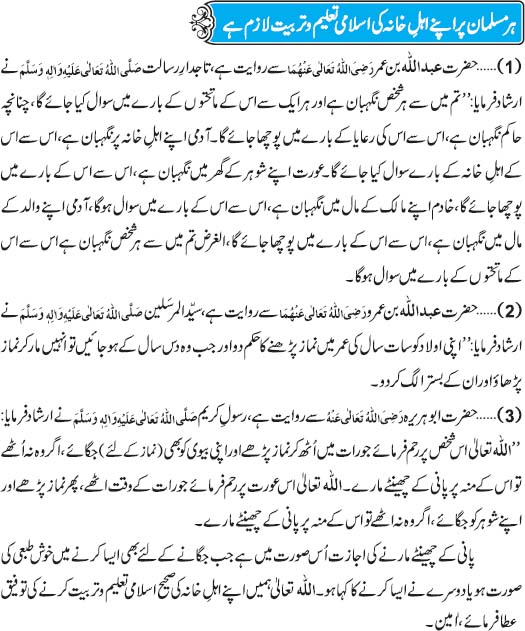
Rasool E Kareem (SAW) Ko Milnay Wala Sawab
Burden Some Bad Company
BOOKS written by eminent Islamic scholars are replete with sayings that indicate an aversion to people who are referred to as being thaqeel, which means burdensome. They are a people whose company is unbearable. Imam Ahmad said they are the people committing acts of innovation. Some have said they are the foolish ones in society, and others have stated they are people with coarse personalities, or that they are people of lifeless and colorless character.?
“They are as blocks of wood propped up.” (Qur’an, 63:4)
“So what is wrong with these people that they fail to understand any word?” (Qur’an, 4:78)
Imam Ash-Shafi’ee said: “When a dull person comes to sit with me, I begin to feel that the earth beneath him is sinking from the heaviness of his company.”
Al-A’mash, upon seeing this kind of person, would recite: “Our Lord! Remove the torment from us, really we shall become believers!” (Qur’an, 44:12)
Allah, the Almighty, said: “And when you see those who engage in a false conversation about Our Verses (of the Qur ‘an) by mocking at them, stay away from them…” (Qur’an, 6:68)
People who are devoid of virtues, who have low aims, and who easily succumb to their desires are among the most unbearable of people to share company with.
“Then sit not with them, until they engage in a talk other than that; (but if you stayed with them) certainly in that case you would be like them.” (Qur’an 4: 140)
A poet said: “Your company upon me is heavy, heavy, heavy. You are in appearance a man yet an elephant in terms of bad company.”
Ibn al-Qayyim said: “If you are forced to converse with someone who is unbearable, lend him your body and deny him your spirit, and travel away with your soul. Lend him a deaf ear and a blind eye until Allah makes a way for you to depart from his company.”
“And obey not him whose heart We have made heedless of Our Remembrance, one who follows his own lusts and whose affair (deeds) has been lost.” (Qur’an 18: 28)
– Excerpts from Aaidh Bin Abdullah Al-Qarni’s book “Don’t Be Sad”
Tijarat Kay Islami Usool

Tijarat Kay Islami Usool
Islam Is The Path Of Truth
I want to share with you what a boy from grade 7 wrote when I gave my class a journal assignment on “What does Islam mean to you?”
(From just this one simple sentence, thousands of statements come to your mind. You don’t know where to start…
I feel that Allah has created every person equally with an open mind. Think of it this way; we were all brought to this earth as a piece of clay. There were two kinds of clay: the hard kind and the soft kind. Islam molds us all. Some are easier to shape than others depending on the softness. Those who are not willing to be molded are destined for the furnace. The better you are molded, the better you’ll turn out. Rasulullah (Salallahu alaihi wassalam) was molded perfectly and he was the best kind of clay.
Islam is the path of Truth.
Here is another way to put it: Doing haram is sickness, Islam is the medicine and paradise is the cure. Once you are cured you are guaranteed health and you’ll never get any more sicknesses… Islam is like a tree.
Everybody starts as a bud and they gradually grow into bigger and redder apple. The more you please Allah, the bigger and the better you get. If you fall off the tree branch you start to shrink and rot. Sort of like falling onto the wrong path instead of the right one.)
Masha’Allah, what an understanding! All this from a 13-year-old boy! May Allah(subhanahu wata’ala) increase him in knowledge, give us all the wisdom to understand and follow our Deen, and continue to shower us with more of His Mercy and blessings. Ameen!
“He grants wisdom to whom He will; and whoever is granted wisdom, he indeed is given a great good…” (2:269)
Sunnat Ki Ahmiyat



Sunnat Ki Ahmiyat
Whom Allah Loves
O believers! Whoever among you abandons their faith, Allah will replace them with others who love Him and are loved by Him. They will be humble with the believers but firm towards the disbelievers, struggling in the Way of Allah; fearing no blame from anyone. This is the favor of Allah. He grants it to whoever He wills. And Allah is All-Bountiful, All-Knowing.. [5:54]
Yet there are men who take (for worship) others besides Allah, as equal (with Allah.: They love them as they should love Allah. But those of Faith are overflowing in their love for Allah. If only the unrighteous could see, behold, they would see the penalty: that to Allah belongs all power, and Allah will strongly enforce the penalty. [2:165]
Who Make Themselves Pure (Mutatahhireen)
Do not stand [for prayer] within it – ever. A mosque founded on righteousness from the first day is more worthy for you to stand in. Within it are men who love to purify themselves; and Allah loves those who purify themselves.. [9:108]
Who Do Good (Muhsineen)
Those who spend (freely), whether in prosperity or in adversity; who restrain anger, and pardon (all) men;- for Allah loves those who do good;- [3:134]
And spend of your substance in the cause of Allah, and make not your own hands contribute to (your) destruction, but do good; for Allah loveth those who do good. [2:195]
There will be no blame on those who believe and do righteous deeds for whatever they might have partaken (in the past) as long as they refrain from things prohibited, and persist in their belief and do righteous deeds, and continue to refrain from whatever is forbidden and submit to divine commandments, and persevere in doing good, fearing Allah. Allah loves those who do good.[5:93]
And Allah gave them a reward in this world and the excellent reward of the Hereafter. For Allah Loveth those who do good. [3:148]
Who Are Firm And Steadfast (Sabireen)
And how many a prophet [fought and] with him fought many religious scholars. But they never lost assurance due to what afflicted them in the cause of Allah, nor did they weaken or submit. And Allah loves the steadfast. [3:146]
Who Fights in His Cause In Battle Array (Yuqatiloona Fee Sabeelihi Saffan)
Truly Allah loves those who fight in His Cause in battle array, as if they were a solid cemented structure. [61:4]
Who Are Just (Muqsiteen)
Allah does not forbid that you be kind and just to those who did not fight against you on account of religion, nor drove you out of your homes. Surely Allah loves those who are equitable. [60:8]
They eagerly listen to falsehood and consume forbidden gain. So if they come to you ˹O Prophet˺, either judge between them or turn away from them. If you turn away from them, they cannot harm you whatsoever. But if you judge between them, then do so with justice. Surely Allah loves those who are just. [5:42]
And if two factions among the believers should fight, then make settlement between the two. But if one of them oppresses the other, then fight against the one that oppresses until it returns to the ordinance of Allah. And if it returns, then make settlement between them in justice and act justly. Indeed, Allah loves those who act justly.[49:9]
Who Act Aright (Muttaqeen)
In exception to those who associate others with Allah in His Divinity are those with whom you have made treaties and who have not violated their treaties nor have backed up anyone against you. Fulfill your treaties with them till the end of their term. Surely Allah loves the pious. [9:4]
Nay.- Those that keep their plighted faith and act aright,-verily Allah loves those who act aright. [3:76]
(How) Can there be a promise for the polytheists with Allah and His Messenger (blessings and peace be upon him) except for those with whom you have made a treaty near the Sacred Mosque (at al-Hudaybiya)? So as long as they remain true to (the treaty with) you, remain true to them. Surely, Allah loves those who fear Him. [9:7]
Who Turn To Him Constantly (Tawwabeen)
And they ask you about menstruation. Say, “It is harm, so keep away from wives during menstruation. And do not approach them until they are pure. And when they have purified themselves, then come to them from where Allah has ordained for you. Indeed, Allah loves those who are constantly repentant and loves those who purify themselves.” [2:222]
Compiled by Dr.Masood Tariq
Har Musalman Par Apnay Ahle Khana Ki Islami Taleem-o-Tarbiat Lazim Hai

Har Musalman Par Apnay Ahle Khana Ki Islami Taleem-o-Tarbiat Lazim Hai
Misconception: The Islamic Threat
In recent years, a great deal of attention in the media has been given to the threat of “Islamic Fundamentalism”. Unfortunately, due to a twisted mixture of biased reporting in the Western media and the actions of some ignorant Muslims, the word “Islam” has become almost synonymous with “terrorism”. However, when one analyzes the situation, the question that should come to mind is: Do the teachings of Islam encourage terrorism? The answer: Certainly not! Islam totally forbids the terrorist acts that are carried out by some misguided people. It should be remembered that all religions have cults and misguided followers, so it is their teachings that should be looked at, not the actions of a few individuals. Unfortunately, in the media, whenever a Muslim commits a heinous act, he is labeled a “Muslim terrorist”. However, when Serbs murder and rape innocent women in Bosnia, they are not called “Christian terrorists”, nor are the activities in Northern Ireland labeled “Christian terrorism”. Also, when right-wing Christians in the U.S. bomb abortion clinics, they are not called “Christian terrorists”. Reflecting on these facts, one could certainly conclude that there is a double standard in the media! Although religious feelings play a significant role in the previously mentioned “Christian” conflicts, the media does not apply religious labels because they assume that such barbarous acts have nothing to do with the teachings of Christianity. However, when something happens involving a Muslim, they often try to put the blame on Islam itself — and not the misguided individual. Certainly, Islamic Law allows war — any religion or civilization that did not would never survive — but it certainly does not condone attacks against innocent people, women, or children.
The Arabic word “jihad”, which is often translated as “Holy War”, simply means “to struggle”. The word for “war” in Arabic is “harb”, not “jihad”. “Struggling”, i.e. “making jihad”, to defend Islam, Muslims or to liberate a land where Muslims are oppressed is certainly allowed (and even encouraged) in Islam. However, any such activities must be done according to the teachings of Islam. Islam also clearly forbids “taking the law into your own hands”, which means that individual Muslims cannot go around deciding who they want to kill, punish, or torture. Trial and punishment must be carried out by a lawful authority and a knowledgeable judge. Also, when looking at events in the Muslim World, it should be kept in mind that a long period of colonialism ended fairly recently in most Muslim countries. During this time, the people in these countries were culturally, materially, and religiously exploited – mostly by the so-called “Christian” nations of the West. This painful period has not really come to an end in many Muslim countries, where people are still under the control of foreign powers or puppet regimes supported by foreign powers.
Also, through the media, people in the West are made to believe that tyrants like Saddam Hussein in Iraq and Moamar Qaddafi in Libya are “Islamic” leaders — when just the opposite is true. Neither of these rulers even professed Islam as an ideology, but only used Islamic slogans to manipulate their powerless populations. They have about as much to do with Islam as Hitler had to do with Christianity! In reality, many Middle Eastern regimes which people think of as being “Islamic” oppress the practice of Islam in their countries. So suffice it to say that “terrorism” and killing innocent people directly contradicts the teachings of Islam.
Tajdar-e-Risalat (PBUH) Ka Pehla Jumma

Tajdar-e-Risalat (PBUH) Ka Pehla Jumma
Misconception: Islam Is Fatalistic
Most Muslims find it rather odd that their religion, which strikes a beautiful balance between faith and action, could be accused of being “fatalistic”. Perhaps this misconception came about because Muslims are taught to say “Praise be to God!” whenever anything good or bad happens. This is because Muslims know that everything comes from Almighty Allah, who is the All-Knowing Sustainer of the Universe, and that since a Muslim should rely completely on Allah, whatever happened must have been for the better. However, this does not mean that Muslims are not taught to take action in life — just the opposite is true. Islam requires not only faith but action — such as regular prayer, fasting, and charity. To be more precise, in Islam actions are part of one’s faith. Islam totally rejects the extreme beliefs of some religions that teach that you shouldn’t go to a doctor when sick, but only pray for God to heal you. Islam’s outlook is very positive since it teaches that human beings can take positive action in this life. This was certainly what was taught by Prophet Muhammad, peace be upon him, to his followers — since they obviously took the action of spreading Islam from Spain to Morocco in a very short period of time. Even though Islam teaches that Allah knows what human beings will do before they do it, human beings still have free will. Certainly, Allah, who is All-Knowing and All-Wise, knows what is going to happen to everyone before it happens — to deny this would be a denial of Allah Himself. However, if human beings did not have free will, it would be ridiculous and unjust for Allah to demand that they do certain things and believe certain things. Far from being “fatalistic”, Islam teaches that a human being’s main purpose in life is to be God-conscious. Due to this, Muslims worry less about material matters and view their earthly life from a proper perspective. This is due to the fact that Islam clearly teaches that if people worship and depend on Almighty Allah alone, then they have nothing to worry about – since Allah wants what is best for them. True freedom, from the Islamic perspective, does not mean aimlessly following all of your human desires for food, drink, wealth, and sex. On the contrary, freedom means being able to control one’s base desires and fulfilling them in a proper and legal way. This brings one’s desires in tune with what God wants for us — only then is a person truly free!

